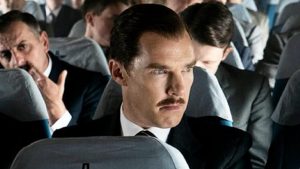In 1960, Oleg Penkovsky, a colonel in the Soviet intelligence agency GRU (not to be confused with the KGB), became very, very concerned about Nikita Khrushchev’s plans to ramp up the USSR’s nuclear missile arsenal. Penkovsky made contact with the American Embassy, offering to leak classified information. After ascertaining his intentions were real, the problem was how to contact Penkovsky so he could pass along confidential information to the west.
The CIA and England’s MI6 decided they couldn’t use one of their own agents. Instead, they recruited a salesman name Greville Wynne — a moniker so British it had to be real — who had already done business in eastern Europe. Appealing to his patriotism, they asked him to travel to Moscow on the premise that he wanted to establish some new accounts. There, he met and befriended Penkovsky, who immediately began giving him state secrets for delivery to London and the US.
So that he’d have plausible deniability, Wynne never opened the packages Penkovsky gave him, merely conveying them to CIA operative Emily Donovan and MI6 agent Dickie Franks. These exchanges took place for a couple of years before they bore fruit with the revelation that the Soviets were placing intercontinental ballistic missiles in Cuba. The information provided by Penkovsky proved vital in the Kennedy administration’s handling of the crisis, and came as he and Wynne developed a real friendship, at one point even meeting each other’s families, even as the world approached the nuclear brink.
That’s the premise of “The Courier,” based on a true story, with Benedict Cumberbatch playing Wynne as a straight shooter bored with his life, who became more and more emboldened by his clandestine role. Fortunately, after being forced to do a dreadful accent from the American south in “The Mauritanian,” Cumberbatch is allowed to use his rich British baritone, making his Wynne instantly believable.
Merab Ninidze plays Penkovsky (codename “Ironbark,” which was the original title of the movie) as an earnest man who risked his life and reputation to avoid what he was sure would be a calamitous clash between the two superpowers. To director Dominic Cooke’s credit, neither Penkovsky nor any of the other Russians come off as the clownish rubes so common in other Cold War-era dramas.
As for Rachel Brosnahan, her CIA officer lived in the same era as her Midge Maisel, albeit with less colorful clothing, but is sadly given little of consequence to do. Similarly, Jessie Buckley (as Sheila Wynne) is limited to several cliché-filled scenes as the worrying wife.
The problem I have in reviewing “The Courier” is that events in an intense third act change everything, and I’m reticent to divulge too much. Let me just say it requires a physical transformation by Cumberbatch that forced the production to shut down for three months so he could achieve a new look which could not have been pulled off merely through lighting and makeup. It allows Cumberbatch to ditch the stoicism and depict a man driven to the edge.
Like “Bridge Of Spies,” the Spielberg-Coen-Hanks drama from 2015 that also centered on Cold War issues, “The Courier” eschews action sequences in favor of lots of talking, posturing, and more talking. In the hands of lesser filmmakers, that blueprint could prove deathly boring. But like its predecessor, it kept my interest all the way through — despite its flaws.
I give “The Courier” a 7 out of 10. Now playing in theaters, with no streaming plans announced.

